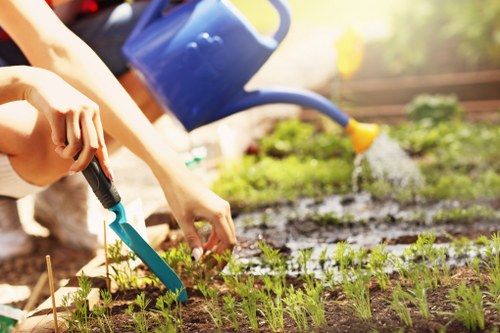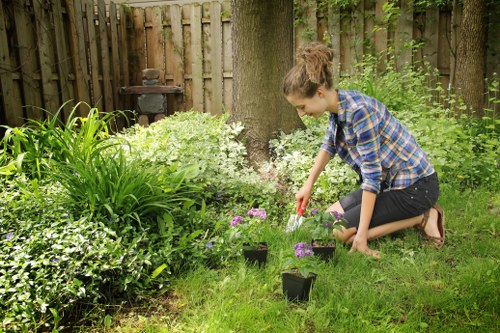Garden Maintenance in Highgate: Keeping Your Green Space Pristine

Maintaining a beautiful garden in Highgate requires dedication, knowledge, and the right techniques. Whether you're a seasoned gardener or a beginner, understanding the specific needs of your garden can make all the difference in achieving a lush, vibrant outdoor space.
Highgate's unique climate and soil conditions play a crucial role in determining the types of plants that will thrive. From the choice of shrubs to the timing of your planting schedule, every decision impacts the overall health and appearance of your garden.
In this comprehensive guide, we'll explore the essential aspects of garden maintenance in Highgate, offering tips and strategies to help you create and sustain a beautiful garden all year round.

Understanding Highgate's Climate and Soil
Highgate enjoys a temperate climate, characterized by mild summers and cool winters. This climate is conducive to a wide variety of plants, but understanding the local weather patterns can help in planning your garden effectively.
Soil Preparation
The soil in Highgate varies, but it's essential to test your soil's pH and nutrient levels before planting. Highgate gardeners often enrich their soil with organic matter to improve fertility and drainage.
- Conduct a soil test to determine pH and nutrient levels.
- Add compost or manure to enhance soil structure.
- Ensure proper drainage to prevent waterlogging.
Proper soil preparation lays the foundation for healthy plant growth and reduces the risk of diseases and pests.

Seasonal Garden Maintenance Tips
Maintaining your garden throughout the year requires different tasks depending on the season. Here's a breakdown of essential maintenance activities for each season in Highgate.
Spring
Spring is the ideal time to prepare your garden for the growing season.
- Clean up any debris from the winter months.
- Prune dormant trees and shrubs.
- Plant new flowers and vegetables.
Ensuring your garden is ready in spring sets the stage for a productive and beautiful season.

Summer
Summer maintenance focuses on watering, weeding, and protecting plants from the heat.
- Water plants deeply and consistently.
- Control weeds to reduce competition for nutrients.
- Provide shade or mulch to retain moisture.
Proper summer care helps plants thrive despite the warmer temperatures.
Autumn
Autumn is a time for harvesting and preparing the garden for winter.
- Harvest vegetables and cut back perennials.
- Rake fallen leaves to prevent mold and pests.
- Plant bulbs for spring blooms.
These tasks ensure your garden remains healthy through the colder months.

Winter
Winter maintenance involves protecting plants from frost and planning for the next season.
- Apply mulch to insulate plant roots.
- Prune evergreen shrubs carefully.
- Plan your garden layout and order seeds for spring.
Even in winter, attentive care can keep your garden in top condition.
Choosing the Right Plants for Highgate Gardens
Selecting plants that are well-suited to Highgate's climate and soil conditions is crucial for a thriving garden. Consider native species as they are adapted to the local environment and require less maintenance.
Perennials vs. Annuals
Both perennials and annuals have their place in a garden. Perennials return year after year, providing long-term structure, while annuals offer vibrant, seasonal color.
- Perennials: Lavender, Hostas, Daylilies
- Annuals: Marigolds, Petunias, Zinnias
Incorporating a mix of both can create a dynamic and resilient garden.
Gardening Tools and Equipment
Having the right tools is essential for effective garden maintenance. Investing in quality equipment can make tasks easier and more efficient.
Basic Tools
- Gloves
- Pruning shears
- Garden fork
- Spade and shovel
- Watering can or hose
These tools cover the fundamental needs of most garden maintenance tasks.
Advanced Equipment
For larger gardens or more specialized tasks, consider investing in advanced equipment.
- Lawnmower
- Leaf blower
- Hedge trimmer
- Wheelbarrow
Having the right tools can significantly enhance your gardening efficiency.
Professional Garden Maintenance Services in Highgate
If maintaining your garden becomes overwhelming, professional services are available to help. Professional gardeners bring expertise and equipment to ensure your garden remains beautiful.
Benefits of Hiring Professionals
- Expert knowledge of local plants and conditions.
- Time-saving and efficient maintenance.
- Access to specialized tools and techniques.
Hiring professionals can alleviate the stress of garden maintenance and ensure optimal results.
Choosing the Right Service
When selecting a garden maintenance service in Highgate, consider the following:
- Experience and reputation.
- Range of services offered.
- Pricing and contract terms.
- Customer reviews and testimonials.
Carefully evaluating these factors can help you find a reliable and competent service provider.
Eco-Friendly Garden Practices
Adopting eco-friendly practices in your garden not only benefits the environment but can also enhance the health and beauty of your plants.
Composting
Composting kitchen scraps and garden waste creates rich, organic fertilizer that improves soil health.
- Reduces waste sent to landfills.
- Provides essential nutrients for plants.
- Enhances soil structure and drainage.
Water Conservation
Implementing water-saving techniques helps manage resources effectively.
- Use drip irrigation systems.
- Install rain barrels to collect rainwater.
- Choose drought-resistant plants.
These practices contribute to a sustainable and thriving garden.
Pest and Disease Management
Protecting your garden from pests and diseases is essential for maintaining plant health. Integrated Pest Management (IPM) strategies offer a balanced approach.
Identification and Monitoring
Regularly inspect plants for signs of pests or diseases.
- Look for discolored leaves or unusual growths.
- Identify common Highgate garden pests like aphids and slugs.
- Monitor pest populations to address issues early.
Natural Remedies
When possible, use natural solutions to manage pests.
- Introduce beneficial insects like ladybugs.
- Use neem oil or insecticidal soap.
- Encourage plant diversity to deter pests.
These methods reduce the reliance on chemical pesticides and promote a healthier garden ecosystem.
Mulching and Its Benefits
Mulching is a vital aspect of garden maintenance that offers numerous benefits for plant health and soil preservation.
Types of Mulch
- Organic Mulch: Wood chips, straw, and leaves.
- Inorganic Mulch: Gravel, plastic sheeting.
Advantages of Mulching
Applying mulch can:
- Conserve soil moisture.
- Suppress weed growth.
- Regulate soil temperature.
- Improve soil fertility as organic mulch decomposes.
Regular mulching contributes to a well-maintained and sustainable garden.
Lawn Care in Highgate
A well-maintained lawn is a key feature of any Highgate garden. Proper lawn care involves several practices to ensure a lush and healthy grassy area.
Mowing Techniques
- Mow at the recommended height for your grass type.
- Keep mower blades sharp to make clean cuts.
- Vary mowing patterns to prevent soil compaction.
Fertilizing and Aeration
Regular fertilization provides essential nutrients for grass growth.
- Use a balanced fertilizer suited to your lawn type.
- Aerate your lawn annually to reduce soil compaction.
- Overseed thin areas to promote uniform growth.
These practices help maintain a thick and resilient lawn.
Pruning and Trimming
Pruning and trimming are essential for shaping plants, encouraging growth, and maintaining plant health in your Highgate garden.
When to Prune
- Prune spring-flowering shrubs immediately after blooming.
- Trim summer-active plants in late winter or early spring.
- Remove dead or diseased branches as needed.
Pruning Techniques
Use proper techniques to avoid damaging plants:
- Make clean cuts at a 45-degree angle.
- Remove no more than one-third of the plant at a time.
- Use sharp, sterilized tools to prevent disease spread.
Effective pruning promotes healthy growth and enhances the aesthetic appeal of your garden.
Planting and Transplanting
Proper planting and transplanting practices are vital for establishing strong, healthy plants in your Highgate garden.
Planting Techniques
- Choose the right location based on sunlight and soil requirements.
- Dig a hole twice as wide as the root ball but no deeper.
- Gently loosen roots before placing the plant in the hole.
- Backfill with soil, firming gently to eliminate air pockets.
- Water thoroughly after planting.
Transplanting Tips
When transplanting existing plants:
- Transplant during the cooler months to reduce stress.
- Handle plants by the root ball to minimize damage.
- Provide adequate support until plants establish.
Following these steps ensures successful establishment and growth of new or moved plants.
Garden Lighting and Decor
Enhancing your garden with lighting and decor can add beauty and functionality, allowing you to enjoy your garden even after sunset.
Lighting Options
- Solar-powered garden lights for eco-friendly illumination.
- String lights for a festive atmosphere.
- Spotlights to highlight key features like trees or sculptures.
Decorative Elements
Incorporate decorative elements to personalize your garden:
- Garden statues or sculptures.
- Water features like fountains or ponds.
- Decorative planters and pathways.
These additions can transform your garden into a charming and inviting space.
Maintaining Garden Paths and Structures
Paths and structures add functionality and aesthetic appeal to your garden. Proper maintenance ensures they remain safe and attractive.
Path Maintenance
- Regularly remove weeds growing in pathways.
- Repair any cracks or uneven sections promptly.
- Clean surfaces to prevent moss and algae buildup.
Structural Maintenance
Garden structures like pergolas, fences, and sheds require upkeep:
- Inspect for damage and perform necessary repairs.
- Apply protective coatings to prevent weathering.
- Maintain hardware and hinges for functionality.
Well-maintained structures enhance the overall look and usability of your garden.
Sustainable Gardening Practices
Embracing sustainable gardening practices contributes to environmental conservation and creates a healthier garden ecosystem.
Reducing Chemical Use
- Opt for organic fertilizers and pest control methods.
- Encourage natural predators to manage pests.
- Implement crop rotation to maintain soil health.
Biodiversity and Companion Planting
Diverse plantings promote a balanced ecosystem:
- Plant a variety of species to attract beneficial insects.
- Use companion planting to enhance growth and deter pests.
- Incorporate native plants to support local wildlife.
These strategies foster a resilient and thriving garden environment.
Conclusion: Achieving a Beautiful Garden in Highgate
Successful garden maintenance in Highgate involves understanding local conditions, selecting appropriate plants, and implementing regular maintenance practices. By following the tips and strategies outlined in this article, you can create and sustain a beautiful, healthy garden that enhances your home's appeal and provides a peaceful retreat.
Whether you choose to maintain your garden yourself or hire professional services, dedication and informed decision-making are key to achieving the garden of your dreams.
Contact us today to learn more about expert garden maintenance services in Highgate and take the first step toward a stunning outdoor space!

